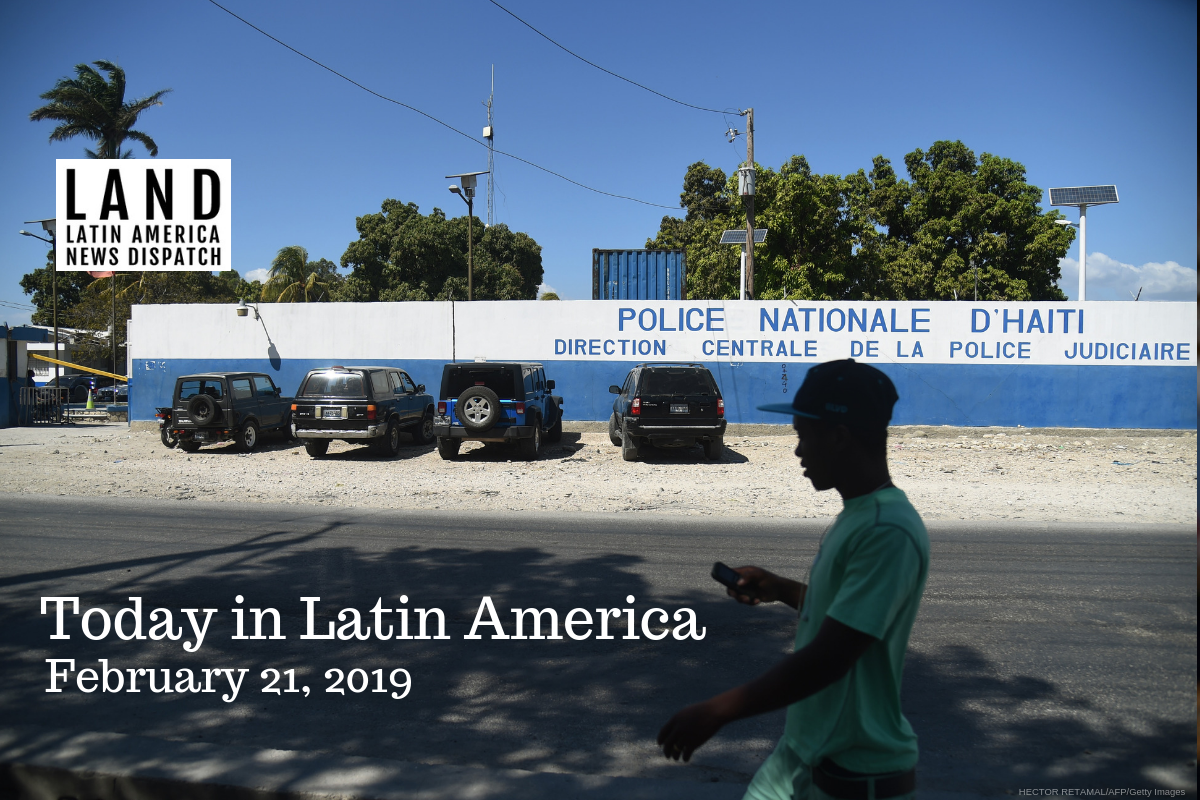

View of the offices of the ‘Direction Centrale de la Police Judiciaire’ where Foreigners who were arrested on the previous night are detained in Port-au-Prince, on February 18, 2019. (Photo by Hector Retamal/AFP/Getty Images)
HAITI: Eight men detained in Port-au-Prince after driving through the city with a large arsenal of weapons were returned to the United States yesterday. The Haitian Prime Minister Jean-Henry Céant said that the men apprehended at a police checkpoint on Monday were “mercenaries and terrorists” attempting to target the government.
The men “said that they were here on a ‘government mission,’” Miami Herald reporter Jacqueline Charles told NPR from Port-au-Prince yesterday.
Five of the men are U.S. citizens and three are U.S. military veterans; two are former Navy Seals and one is a Marine Veteran. The five men boarded a flight to Miami yesterday evening. They were escorted onboard without shackles by U.S. embassy staff.
HEADLINES FROM THE WESTERN HEMISPHERE
NORTH AMERICA
UNITED STATES: At a conference in San Salvador yesterday, U.S. Homeland Security Secretary Kirstjen Nielsen said that Central American nations have committed to cooperating with the United States to stop migrant caravans and fight transnational crime. Nielsen met with leaders from Guatemala, Honduras, and El Salvador to discuss human trafficking, organized crime, gangs and border security. “I want to thank my colleagues for their determination to increase cooperation with respect to caravans,” she said. “We are working together to understand their purpose, their plans, and make sure that those who are vulnerable contained within them are protected.”
MEXICO: Mexico’s privacy watchdog said yesterday that the attorney general’s office obstructed its investigations into the government’s use of Israeli spyware for over a year. The Institute for Transparency, Access to Information and Protection of Personal Data was investigating the Mexican government’s use of the Israel-based NSO Group’s Pegasus software to target journalists, activists and lawyers. Representatives from the Institute said that the Attorney General’s Office finally provided them with Pegasus licensing contracts from 2016 and 2017 earlier this week.
MEXICO: Community activist Samir Flores was murdered yesterday in his hometown of Amilcingo, Morelos. Flores was a 35-year-old activist fighting against the Mexican government’s plans to build a gas pipeline through Central Mexico. His death comes just three days before a public referendum on the Morelos Comprehensive Project and its pipeline. Although President Andrés Manuel López Obrador denounced the murder, he said that the public referendum will continue according to schedule. The predominantly indigenous communities near the proposed pipeline have fought against the project for years, fearing health and safety issues.
CENTRAL AMERICA
NICARAGUA: Yesterday, a $100 million loan from Taiwan gave a financial lifeline to the increasingly isolated regime of President Daniel Ortega. Taiwanese authorities have stated that the funds will be allocated for “reconstruction” efforts in the Central American country, which has been rocked by mass demonstrations since last year. Nicaragua remains one of the few Latin American countries that has diplomatic ties with Taiwan rather than China.
PANAMA: The oldest marine mammal in Central America was found yesterday in a construction site near the Panama Canal. Researchers from the Florida Museum of Natural History (FMNH) unearthed a tusked sea cow that is estimated to be 20-million years old. At 15-feet long, the historic finding is said to belong to a new genus and species, Culebratherium alemani. Researchers took the name from Alberto Aleman Zubieta, the former chief executive officer of the Panama Canal, who was deemed essential to the excavation.
THE ANDES
PERU: Peru launched a campaign to eliminate illegal gold mining in one of the Amazon’s richest and most biodiverse areas this week. The government sent 1,500 police officers to the Madre de Dios region, which has been suffering from deforestation due to wildcat mining. President Martín Vizcarra suspended civil liberties and tasked the military with restoring the rule of law to the region as part of a six-month state of emergency.
VENEZUELA: Tensions between Russia and the United States have grown over providing humanitarian aid to Venezuela. Russia has sent medical supplies and aid to President Nicolás Maduro while the Maduro administration continues to block U.S. shipments of aid stuck at the border with Colombia. Meanwhile, British billionaire Richard Branson and Maduro are locked in a competition about concerts scheduled this Friday along the Colombia-Venezuela border. Branson has organized an aid concert for Venezuela near the site where urgent supplies are being blocked by the Maduro administration. However, Maduro has scheduled a rival concert to occur at the same time on the Venezuelan side of the border.
SOUTHERN CONE
BRAZIL: President Jair Bolsonaro said yesterday that Brazilians should work longer before they receive a pension. Bolsonaro proposed increasing the retirement age to 65 for men and 62 for women. Many Brazilians are currently able to retire as early as age 50 or 55. This adjustment to retirement ages — an effort to rescue Brazil’s troubled social security system and lessen differences between public and private sector employees — was one of Bolsonaro’s campaign promises.
GOT NEWS? Send the editors tips, articles and other items for inclusion in Today in Latin America to tips@latindispatch.com.
Subscribe to Today in Latin America by Email


